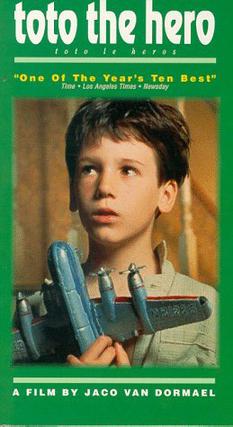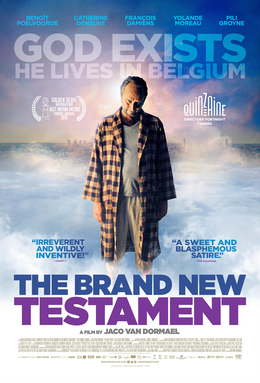Pierre Van Dormael was a Belgian jazz guitarist and composer.

Pascal Duquenne is a Belgian actor. He shared the Best Actor Award in the 1996 Cannes Film Festival for his performance as Georges in the movie The Eighth Day, with Daniel Auteuil, who played Harry. He lives in Brussels. He has Down syndrome. In 2004, he received the very high civil distinction of Commander in the Order of the Crown (Belgium).

Toto the Hero is a 1991 Belgian film by Belgian film director and screenwriter Jaco Van Dormael. It won the Caméra d'Or award at the Cannes Film Festival in 1991, and the César Award for Best Foreign Film in 1992. The film was selected as the Belgian entry for the Best Foreign Language Film at the 64th Academy Awards, but was not accepted as a nominee.

The Eighth Day is a 1996 Franco-Belgian comedy-drama film that tells the story of the friendship that develops between two men who meet by chance. Harry, a divorced businessman who feels alienated from his children, meets Georges, an institutionalised man with Down syndrome, after Georges has escaped from his mental institution and is nearly run over by Harry. The film was selected as the Belgian entry for the Best Foreign Language Film at the 69th Academy Awards, but was not accepted as a nominee.

Cinema of Belgium refers to the film industry based in Belgium. Belgium is essentially a bi-lingual country divided into the Flemish (Dutch-speaking) north and the French-speaking south. There is also a small community of German speakers in the border region with Germany. Belgium is further a federal country made up of three regions and three language communities . Due to these linguistic and political divisions it is difficult to speak of a national, unified Cinema of Belgium. It would be more appropriate to talk about Flemish or Dutch-language cinema of Belgium and Walloon or French-language cinema of Belgium.

Mr. Nobody is a 2009 science fiction drama film written and directed by Jaco Van Dormael and starring Jared Leto, Sarah Polley, Diane Kruger, Linh Dan Pham, Rhys Ifans, Natasha Little, Toby Regbo, and Juno Temple. It tells the life story of Nemo Nobody, a 118-year-old man who is the last mortal on Earth after the human race has achieved quasi-immortality. Nemo, memory fading, tells a doctor and journalist about his three main loves and his parents' divorce and the subsequent hardships he endured. The speculative narrative frequently changes course to investigate the alternate life paths that could have resulted from his making different decisions in his life, focusing on when he is nine, fifteen, and thirty-four. The film has a nonlinear narrative that incorporates the multiverse hypothesis.

The 44th Cannes Film Festival was held from 9 to 20 May 1991. The Palme d'Or went to Barton Fink by Joel Coen and Ethan Coen.

Pan-Européenne is a French film production and publishing company. Originally only a distribution company, in 1992 it began also a production company, producing Beau fixe. It has produced various films, including Jaco Van Dormael's The Eighth Day (1996) and Mr. Nobody (2009), Jérôme Salle's Largo Winch (2008), and distributed Bryan Singer's The Usual Suspects (1995), Frank Miller and Robert Rodriguez's Sin City (2005).
Maedeli la brèche is a 1980 Belgian short film written and directed by Jaco Van Dormael. The short film was shot in 1980 in Belgium with a Super 35 camera. The film starred Nico d'Oreye, Julie Dubart, Colette Forton, Marie-José Mgank and Jean-François Dufranne. The original music score was written by Pierre Van Dormael, Jaco's brother. Van Dormael wrote the film while he was a student at the INSAS in Brussels.
È pericoloso sporgersi is a 1984 Belgian short film written and directed by Jaco Van Dormael. The short film was shot in 1984 in Belgium. The film starred Mathieu Chemin, Joëlle Waterkeyn and Dirk Pauwels. It was produced by Iblis Films (Brussels). È pericoloso sporgersi tells the story of a child who has been thrust into a position where he must make an impossible decision.
L'imitateur is a 1982 Belgian documentary short film written and directed by Jaco Van Dormael. The short film was shot in 1982 in Belgium. L'imitateur tells the story of two mentally disabled which do a brief intrusion into the world of "normal people". The film was awarded the Best Documentary and Best Short Film at the 1983 Brussels Film Festival. In 2011, it appeared at the Sottodiciotto Filmfestival held in Turin in the retrospective dedicated to Van Dormael.
Stade 81 is a 1981 documentary short film written and directed by Jaco Van Dormael. The short film was shot in 1981 in Sweden, Canada and United Kingdom. Stade 81 is a documentary about the first Special Olympics. The film received various awards, including the Caducee d'Or at the 1982 Rennes International Film Festival. In 2011, it appeared at the Sottodiciotto Filmfestival held in Turin in the retrospective dedicated to Van Dormael.

The 1st Magritte Awards ceremony, presented by the Académie André Delvaux, honored the best films of 2010 in Belgium and took place on 5 February 2011 at the Square in the historic site of Mont des Arts, Brussels, beginning at 7:30 p.m. CET. During the ceremony, the Académie André Delvaux presented Magritte Awards in twenty categories. The ceremony, televised in Belgium by BeTV, was produced by José Bouquiaux and directed by Vincent J. Gustin. Film director Jaco Van Dormael presided the ceremony, while actress Helena Noguerra hosted the evening. The pre-show ceremony was hosted by film director Fabrice Du Welz.
The Magritte Award for Best Director is an award presented annually by the Académie André Delvaux. It is given in honor of a film director who has exhibited outstanding directing while working within the film industry. It is one of the Magritte Awards, which were established to recognize excellence in Belgian cinematic achievements.

Mr. Nobody is a film score by Belgian musician Pierre Van Dormael, released on January 26, 2010, in Belgium, accompanying the 2009 film of the same name, directed by Jaco Van Dormael and starring Jared Leto, Sarah Polley, Diane Kruger, and Linh Dan Pham. Mr. Nobody is the last film of composer Pierre Van Dormael before his death in 2008.
The Magritte Award for Best Screenplay is an award presented annually by the Académie André Delvaux. It is one of the Magritte Awards, which were established to recognize excellence in Belgian cinematic achievements.
Bénédicte Liénard is a Belgian filmmaker.

The Brand New Testament is a 2015 fantasy dark comedy film written, produced, and directed by Jaco Van Dormael. It is a co-production among Belgium, France, and Luxembourg. The film was screened at the Directors' Fortnight section at the 2015 Cannes Film Festival. It was selected as the Belgian entry for the Best Foreign Language Film at the 88th Academy Awards, making the December shortlist of nine films, but was not nominated. The Brand New Testament received ten nominations at the 6th Magritte Awards, winning four awards, including Best Film and Best Director for Van Dormael. The film has become a cult film.
Juliette Van Dormael is a Belgian cinematographer. Her mother is Laurette Vankeerberghen and father Jaco Van Dormael. She is known for the feature film "Mon ange" (2016). Earlier she worked with the shorts "Jay parmi les hommes" (2015) and "Mouettes" (2013) among others. She has studied cinematography in INSAS Film School in Brussels between 2008 and 2013.












